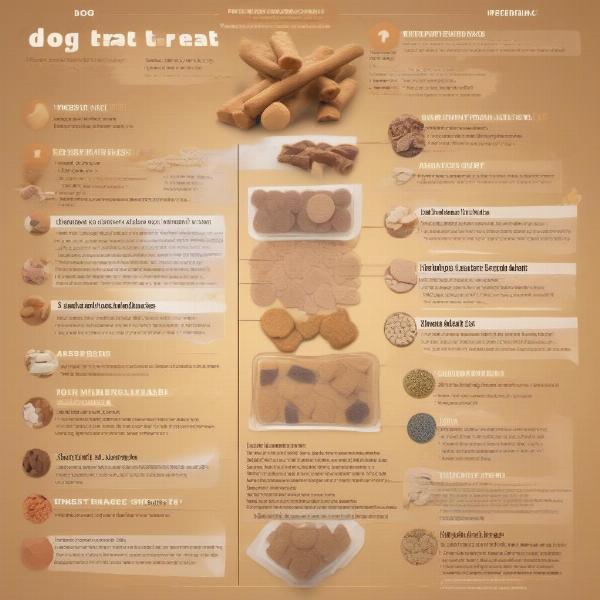Roger Wood hot dogs, while a tasty treat for humans, are not suitable for canine consumption. This article addresses the common search query “Roger Wood hot dogs” from a dog owner’s perspective, clarifying the potential dangers and offering healthier alternatives for treating your furry friend. Many dog owners, especially new ones, might inadvertently search for this term, believing it relates to dog-friendly treats. It’s crucial to understand that human foods, especially processed meats like hot dogs, can be harmful to dogs.
Processed meats like Roger Wood hot dogs are high in sodium, fat, and often contain seasonings like onion and garlic, which are toxic to dogs. These ingredients can cause digestive upset, pancreatitis, and even more severe health problems. While a small nibble might not cause immediate harm, it’s best to avoid feeding your dog any amount of human-processed meats.
Why are Roger Wood Hot Dogs Bad for Dogs?
Let’s delve into the specifics. What makes Roger Wood hot dogs, and hot dogs in general, so detrimental to our canine companions? The high sodium content can lead to dehydration and even sodium ion poisoning. The high fat content contributes to obesity and pancreatitis, a painful inflammation of the pancreas. Furthermore, seasonings like onion and garlic, often found in hot dogs, damage red blood cells in dogs, leading to anemia.
Healthy Alternatives to Roger Wood Hot Dogs
So, what can you give your dog instead of Roger Wood hot dogs? Plenty of healthy and delicious options exist! Small pieces of cooked, unseasoned chicken, beef, or turkey are excellent protein sources. Many dogs also enjoy fruits and vegetables like carrots, apples (without the core and seeds), and blueberries. Always ensure these treats are given in moderation and are appropriate for your dog’s size and dietary needs. Numerous commercially available dog treats are formulated to provide balanced nutrition and satisfy your dog’s chewing instincts.
Choosing the Right Treats for Your Dog
Selecting the right treat involves considering your dog’s age, breed, size, and any specific dietary needs or allergies. Puppies have different nutritional requirements than adult dogs, and some breeds may be prone to certain health conditions that influence treat choices. Always check the ingredient list and avoid treats with artificial colors, flavors, and preservatives.
 Checking dog treat ingredient labels.
Checking dog treat ingredient labels.
“Always prioritize your dog’s health and well-being when selecting treats,” advises Dr. Emily Carter, a veterinary nutritionist with over 15 years of experience. “Opt for natural, wholesome ingredients and avoid anything that could potentially harm them.”
Conclusion
While the search query “Roger Wood hot dogs” might arise from a place of wanting to treat our furry friends, it’s essential to understand that human foods like hot dogs are not suitable for dogs. Prioritize their health by offering safe and nutritious alternatives, ensuring they receive the best possible care.
FAQ
- Can dogs eat Roger Wood hot dogs? No, hot dogs are not recommended for dogs due to their high sodium, fat content, and potentially toxic seasonings.
- What should I do if my dog ate a Roger Wood hot dog? Monitor your dog closely for any signs of distress, such as vomiting or diarrhea. Contact your veterinarian if you notice any unusual symptoms.
- What are some safe treats for dogs? Small pieces of cooked, unseasoned meat, certain fruits and vegetables, and commercially available dog treats are generally safe options.
- How do I choose the right treats for my dog? Consider your dog’s age, breed, size, and any dietary restrictions. Check ingredient lists carefully.
- Are there any human foods that are toxic to dogs? Yes, many human foods, including chocolate, grapes, raisins, onions, and garlic, are toxic to dogs.
- What should I feed my dog as a primary diet? High-quality dog food formulated for your dog’s age and breed is recommended.
- Where can I find more information about dog nutrition? Consult your veterinarian or a certified veterinary nutritionist for personalized advice.
About ILM Dog: ILM Dog is your trusted international resource for all things dog-related. We offer expert advice on Dog Breeds and Selection, Health and Medical Care, Training and Behavior, Nutrition and Feeding, Grooming, and Products and Accessories. We are dedicated to providing practical, reliable information to help you care for your canine companion. For more information, contact us at [email protected] or call us at +44 20-3965-8624.